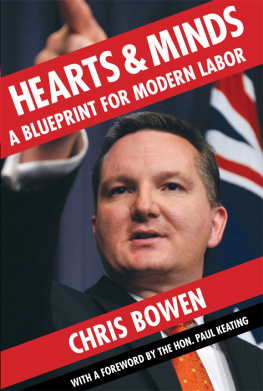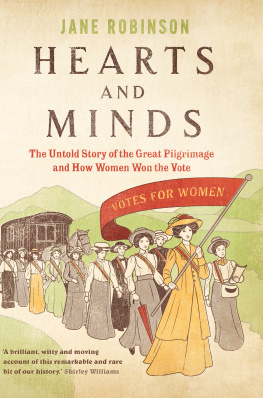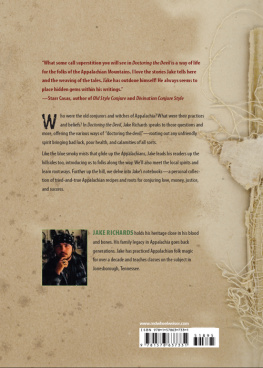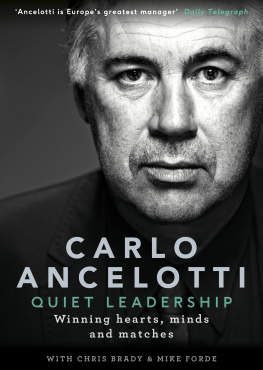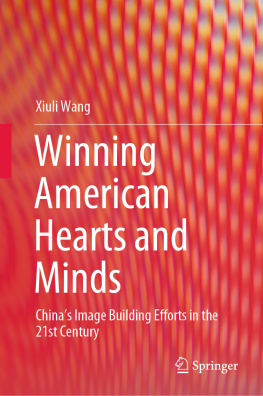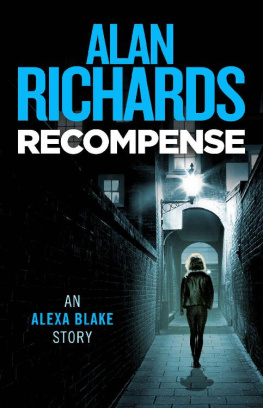Richards - The art of winning commitment 10 ways leaders can engage minds, hearts, and spirits
Here you can read online Richards - The art of winning commitment 10 ways leaders can engage minds, hearts, and spirits full text of the book (entire story) in english for free. Download pdf and epub, get meaning, cover and reviews about this ebook. City: New York, year: 2004, publisher: AMACOM, genre: Business. Description of the work, (preface) as well as reviews are available. Best literature library LitArk.com created for fans of good reading and offers a wide selection of genres:
Romance novel
Science fiction
Adventure
Detective
Science
History
Home and family
Prose
Art
Politics
Computer
Non-fiction
Religion
Business
Children
Humor
Choose a favorite category and find really read worthwhile books. Enjoy immersion in the world of imagination, feel the emotions of the characters or learn something new for yourself, make an fascinating discovery.

The art of winning commitment 10 ways leaders can engage minds, hearts, and spirits: summary, description and annotation
We offer to read an annotation, description, summary or preface (depends on what the author of the book "The art of winning commitment 10 ways leaders can engage minds, hearts, and spirits" wrote himself). If you haven't found the necessary information about the book — write in the comments, we will try to find it.
Richards: author's other books
Who wrote The art of winning commitment 10 ways leaders can engage minds, hearts, and spirits? Find out the surname, the name of the author of the book and a list of all author's works by series.
The art of winning commitment 10 ways leaders can engage minds, hearts, and spirits — read online for free the complete book (whole text) full work
Below is the text of the book, divided by pages. System saving the place of the last page read, allows you to conveniently read the book "The art of winning commitment 10 ways leaders can engage minds, hearts, and spirits" online for free, without having to search again every time where you left off. Put a bookmark, and you can go to the page where you finished reading at any time.
Font size:
Interval:
Bookmark:
THE ART
OF WINNING
COMMITMENT
OF WINNING
COMMITMENT

10 Ways Leaders Can Engage
Minds, Hearts, and Spirits
Dick Richards

For Melanie
The core of this booka set of leadership competencies for inspiring mind, heart, and spiritwas forged in the domain that encompasses experience, observation, reflection, and application. The book is a result of more than three decades of consulting, coaching, and training leaders and prospective leaders in over fifty organizations and in more than a dozen countries. It owes much to all of the clients and friends who generously shared their stories and their challenges, and who invited me on their expeditions to develop their leadership abilities.
The seed of the book was an electronic document nurtured in partnership with my friend and colleague Rick McKnight, and first brought to the marketplace by Tom Brown, a pioneer internet publisher. John Willig, who is my literary agent, encouraged the document to become a book and found a home for it. Adrienne Hickey, acquisitions editor for AMACOM, recognized it as a valuable contribution to the literature of leadership, and Christina McLaughlin and Erika Spelman patiently and sensitively guided it into this its present form. I am grateful to all of them.
Twenty leaders and leadership thinkers stepped forward to share their stories and insights: Odds Bodkin, Matt Catingub, Wesley Clark, Kathy Covert, Pat Croce, Jim Ellis, Vincent Francia, Dale Fushek, Dawn Gutierrez, Alice Harris, Mary Ellen Hennen, David Hollister, Marvin Israelow, Michael Jones, Wilma Mankiller, Beverly ONeill, Zalman Schachter-Shalomi, Bill Strickland, Jim Wold, and Bonnie Wright. Whenever the writing bogged down I returned to their ideas and experiences and found inspiration. I am grateful to all of them as well.
Others gave invaluable assistance by connecting me with those who agreed to be interviewed, or by offering advice and counsel, or by reading and commenting on early drafts. For those things, great thanks go to Linne Bourget, Bob Canady, George Davis, Kathryn Hall, Nick Head, Bob Paull, Norman Schwartzkopf, Christine Whitney-Sanchez, Mike Wold, and Alan Zaklad.
And then there is Melanie Richardsmy amazing and brilliant wife. I have relied on her unflagging drive to scout for information, people, and opportunities, and for finding just the right note in this writing. I have depended on her patience, understanding, creativity, and love. For all of those things, and for much more, I am deeply grateful.
THE ART
OF WINNING
COMMITMENT

and Commitment
On May 22, 1782, just six years after the signing of the Declaration of Independence, U.S. Army Colonel Lewis Nicola, frustrated by the inability of the fledgling American Congress to raise funds to pay the army, wrote to President George Washington urging him to become king of the United States. Washingtons refusal was adamant. He wrote back to Nicola on the same day: If you have any regard for your country, concern for yourself or posterity, or respect for me... banish these thoughts from your mind, and never communicate, as from yourself, or any one else, a sentiment of the like nature.
Nicolas desire for a sovereign ruler and Washingtons rebuff reflect the early stages of a shift in human consciousness, and a revolution in human expectations about leadership. Nicolas urgings were in tune with previous human experience and with the inclination of human consciousness at that time. Until the early years of the twentieth century, enthroning a sovereign, a king or perhaps an emperor, was the thing for new nations to do. Greece enthroned a king in 1829, Belgium in 1831, Norway in 1908, and Albania in 1913. The ill-fated King Faisal was installed by the British as the ruler of Iraq in 1921. Colonel Nicola was simply deferring to an impulse that continues in some places today, more than 200 years later. The impulse to sovereignty still holds sway in many organizations, and in recent years some business leaders have behaved like the worst of sovereigns, robbing the treasury to meet their own twisted needs at the expense of their subjects.
A 1999 report by Freedom House pointed out that there were no true electoral democracies as late at the beginning of the twentieth century. Some countries, such as the United States and Britain, did have electoral systems, but large segments of their citizenry were denied the right to vote. Things had changed by the middle of the century, when 31 percent of the worlds population lived in 22 democratic nations. By the end of the century, 62.5 percent lived in 120 democracies, causing Freedom House to dub the 1900s as Democracys Century. Freedom House described this dramatic shift as one of a growing global human rights and democratic consciousness.
This shift has demanded leadership that is increasingly more respectful toward those being led: from the dismissive declaration, Let them eat cake, which is most often attributed to Marie Antoinette, to Herbert Hoovers patriarchal promise of, A chicken in every pot, to Martin Luther Kings as yet unfulfilled vision of all people singing together, Free at last! Free at last!
Ancient wisdom about leadership is generally immaterial to the democratic consciousness. For example, Sun-Tzus The Art of War, written about 500 B.C., advises leaders to regard their soldiers as their children. He and Renaissance philosopher Nicolo Machiavelli both extolled the virtues of deceit and firm discipline. But the volume and rapidity of modern communication, the ease of access to information and to varying opinions, along with an increase in literacy and sophistication in the world population, have all conspired to render humankind less susceptible to deceit. Democracy has made us less responsive to the firm discipline of those who would behave as sovereigns. Much of what the old texts advise does not play well today.
We have become more difficult to lead. Another consequence of democratic consciousness is that acceptance of any particular authority is more optional than it once was. Political leaders can be voted in or out of office, new jobs can be found, with new bosses, and there is a different brand of religion in a synagogue, church, or mosque just around the corner. Today, we no longer rely on only two or three authoritative network news anchors to translate the worlds events for uscable television provides a plethora of authorities. The Internet has made it possible for each of us to develop our own authoritative voice by making ever more information and knowledge readily available, and by giving each of us a platform to reach the whole world with our own unique message.
The factors that have made us more difficult to lead provide, on the other hand, leadership opportunities. The ascendance of democratic consciousness is marked by liberation of the whole personthought, feeling, and spirit. Thus, todays leaders must be capable of dealing with all facets of the whole person. This complexity is sometimes problematic because people are so very complex, yet it is also an opportunity because people who are able to
Next pageFont size:
Interval:
Bookmark:
Similar books «The art of winning commitment 10 ways leaders can engage minds, hearts, and spirits»
Look at similar books to The art of winning commitment 10 ways leaders can engage minds, hearts, and spirits. We have selected literature similar in name and meaning in the hope of providing readers with more options to find new, interesting, not yet read works.
Discussion, reviews of the book The art of winning commitment 10 ways leaders can engage minds, hearts, and spirits and just readers' own opinions. Leave your comments, write what you think about the work, its meaning or the main characters. Specify what exactly you liked and what you didn't like, and why you think so.







